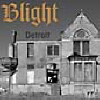 Front man for The Meatmen and almost a founder of Touch & Go records, Tesco Vee is probably most famous for his rude posturing and sense of humor. Before The Meatmen had recorded Crippled Children Suck or War of the Superbikes he was in a noisy outfit by the name of Blight. This 20 track release on Touch & Go covers everything they released and performed during their one year existence.
Front man for The Meatmen and almost a founder of Touch & Go records, Tesco Vee is probably most famous for his rude posturing and sense of humor. Before The Meatmen had recorded Crippled Children Suck or War of the Superbikes he was in a noisy outfit by the name of Blight. This 20 track release on Touch & Go covers everything they released and performed during their one year existence.
Touch & Go
TescoVee enjoyed being shocking, so there's little surprise that heparticipated in a band like this one. Blight was a quartet with thebasic punk setup: drums, bass, guitar, and mumbled, screamed, orotherwise unintelligible vocals. What I can make of their lyrics hassome political bend to it, but more or less they all focus on how fakethe world is and how everyone needs to wake the hell up. In 1982 thismight have been exciting to some kids in the middle of Lansing,Michigan, but their legacy doesn't amount to much in the scheme ofthings. Blight is big on bass, letting it stand out over the rest ofthe music, almost like an instrument of dance that is phased out andwarped just enough to make it "edgy". In fact, the contrast between thebass and the rest of the band is corny, the bass sounding like itbelongs in porn venues the world over. The guitars are sheets of noiseand feedback, with a hint of melody and rhythm. Think Joy Division's"Atrocity Exhibition" spread out over an entire album, but without aninteresting singer or a drummer who could do anything beyond using hishi-hat in the way every fifth grader is familiar with because of AC/DC.Every now and then Vee pulls out an "electronic trumpet" and bleats outa few notes here and there just to break up the monotony, but it doeslittle to save what amounts to a collection of fairly poor songs.
Evidently Blight's big claim to fame is that they opened for the Dead Kennedy's once. This already sounds like a small town story about some kids who almost were, I know, but that's about all there is to say about the live recordings that are included on this disc. The band's self-titled EP is included on the CD along with some four-track demos and their July 29th appearance that lasted a grand total of 16 or so minutes. The liner notes point out that the crowd hated the band, probably because of Vee's opening commentary and his tendency to sound a bit like a rock martyr. On top of that, the band sounds like a wall of mud with drums behind it. In a fashion that stays true to their recorded output, Blight simply pound through some noise and plodding bass parts until they reach the end and do it all over again. The bass parts that had made some of their recorded material at least tolerable is noticeably and painfully absent. In the end, Vee's moaning and screeching vocals sound contrived and the whole mess comes across has some failed experiment in noise-based rock 'n' roll. The only exception is during "The Dream is Dead," where the band suddenly comes to life with a version that sounds better live than it did in the studio. Everyone has a good day, I suppose, but in Blight's case, they had about two good minutes.
samples:
Read More

